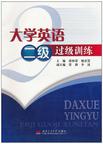大学英语二级过级训练
出版时间:2009-8 出版社:西南交通大学出版社 作者:唐妙荣,等 编 页数:158
内容概要
《大学英语二级过级训练》共分为重点语法知识讲解、套题练习和参考答案及听力材料文本三个部分,它适用于各高职院校准备参加大学英语二级考试的大专生。《大学英语二级过级训练》以《高职高专英语教学基本要求》和《四川省大学英语二、三级考试大纲》为基础,以样题为参考,对四川省大学英语二级考试及其发展变化做了认真分析,总结考试重点;对近年来等级考试及教学实践中积累的材料进行加工筛选,选编了10套模拟练习题,所选试题包括二级考试的最新题型和原有题型,相信对广大考生熟悉、掌握题型,提高做题的正确率会有很大帮助。
书籍目录
重点语法知识讲解一、虚拟语气1.非真实条件句2.虚拟语气语法格式3.It is(high)time that…;wish4.虚拟条件句中的倒装二、从句1.主语从句2.表语从句3.宾语从句4.定语从句5.同位语从句6.状语从句三、强调句四、倒装句1.0nly+状语位于句首表示强调时主谓要倒装'2.never等具有否定意义或否定形式的词或词组居于句首时主谓要倒装3.为加强语气,so(such)that结构中的so(或such)位于句首时主谓要倒装五、全部倒装六、非谓语动词套题练习TEST 1TEST 2TEST 3TEST 4TEST 5TEST 6TEST 7TEST 8TEST 9TEST 10参考答案及听力材料文本参考文献
章节摘录
Passage 4 In America,normally a student must attend a certain number of courses in order to graduate,and each course which he attends gives him a credit(学分).Credits are important to get a degree.In many American universities the total work for a degree consists of thirty-six courses,each lasting for one semester. A typical course consists of three classes per week for fifteen weeks;while attending a university will probably attend four or five courses during a semester.Normally a student would be expect to take four years,with two semesters each year.It is possible to spread the period of work for the degree over a longer period.It is also possible to move between one university and another during his degree course,though in fact this is not done as a regular practice. For every course that he follows,a student is given a grade which is recorded,and the record is available for the student to show to his future employers.All this gives a constant pressure and strain(紧张)of work,but in spite of this,some students still find time for activities in student affairs.Most students are interested in finding a.position in student organizations.The effective work of maintaining(维持)discipline is usually performed by students who advise the school authorities.Any student who is thought to have broken the rules,for example,by cheating,has to appear at a student court.A student who has held one of these positions of authority is much respected and it will benefit him later in his career. Disaster Risk and the Comprehensive Disaster Risk Management A Comparison between Disaster Risk Classifications in Different Mode Ning Li, Yang Lei, Chunhua Li, Peng Zhang, Yue Shi Assessment on Agricultural Drought Vulnerability and Strategy for Resilience Yanrui Shang, Wenshuang Zhao, Yinjie Wang, Huilian Shang Disaster Risk Assessment at Municipal Level in South Africa: The Need for a Multi-Disciplinary Approach A.J. Jordaan Early Warning System and Shake Map for Deep Vrancea Earthquakes (Romania) and Place of Them in Seismic Risk Management Gheorghe Marmureanu, Constantin Ionescu, Alexandru Marmureanu Earthquake Focus Probing and Earthquake Forecast Dexiu Zhao Impact of Disordered Urban Growth on Alluvial Fans, Geomorphic System and the Catastrophic Floods on the North-Central Venezuelan Coast December of 1999 Maximiliano Bezada Impacts of Rapid Urbanization on River Network and Flood Risk in Shenzhen Region, China Hongjian Zhou, Jing'ai Wang, Peijun Shi, Jing Zheng, Lu Gao, Xueguang Su, YiYuan Integration of Public and Private Sectors for Disaster Reduction in Peru's Action Plan 2007~2011 Luis F. Palomino, Julio Kuroiwa Living Intelligently with Risks——An Application of CBDRM in Mitigating Landslides (A Case Study of Landslides Control Project Supported by Oxfam) Wenguang Ding, Juan Yu, Xiujuan Wang, Jian Liu Long-Period Response Spectra of Chi-Chi Main-Shock Recordings and Design Spectra in Chinese Code GB 50011 Yong Chen, Yanxiang Yu Method of Ultra Long Range Weather Prediction by Solar Eclipse and Earthquake Effect Dexiu Zhao Probabilistic Seismic Hazard Modeling Based on the Seismicity Distribution in the North-China Area Yong Yang, Baoping Shi, Boyan Liu Risk Management——A Practical Tool for Communities and Cities Eric Veulliet, Mag. Helmuth Rieder Risk Mitigation through Measurement of Safety Compliance in Built Environment and Establishment of Vulnerability Atlas Vivek Ogra, Manish Bharadwaj, Aurobindo Ogra Strong Ground Motion Field Forecast for Disaster Risk Reduction in Urban Area Xiaxin Tao, Xiaodan Sun, Haiming Liu, Ping Li The Analysis of Economic Methods Choices for Water Resources Sustainable Development in Songhua River Basin Jing Zhang, Jie Shang The Influences of Disaster Information Dissemination on City Public Disaster Risk Perception: Cases Study in Beijing and Wuzbong Na Li, Dong Ma, Yun Su The Relation between Population Vulnerability Post-earthquake and Preparedness Capability for Emergency Resource Xinyan Wu, Jianhua Gu, Shaoyu Wang Turkey's Disaster Management System and Education for Mitigation Akin Demir Institutional Basic and Policy Designing of Reduction Disaster Risk A Process Protocol for Disaster Management and Reconstruction Fleming Andrew, Lee Angela, Brandon Peter Measures to Reduce Safety Risks of Chinese Coal Mines ……
图书封面
评论、评分、阅读与下载
